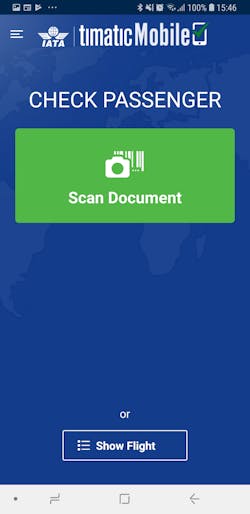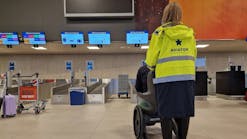Timatic Goes Mobile
Passengers carrying the correct travel documents make everyone’s life easier. It’s less hassle for the passenger, less cost in return trips and fines for airlines, and less confusion for ground support personnel stationed throughout various legs of a trip.
Timatic, an International Air Transport Association (IATA) solution, contains worldwide border control rules and regulations and has been delivering these to ground staff since 1963. Timatic covers all components of immigration compliance, however the three main areas are: passport and other travel documents, visa and visa replacing documents, and health requirements, says Alan Murray Hayden, assistant director of Timatic at IATA.
With a variety of versions having launched over the years, Timatic is used by ground support groups and airlines of all shapes and sizes, in all corners of the world. Today, the big news is the launch of the Timatic Mobile, a mobile application currently being trialed at airports worldwide.
Millions of passengers have their information checked against Timatic each year, saving much time, money and hassle for airlines worldwide. According to IATA, automating this travel document process saves airlines up to 59 cents per passenge.
“Given the high number of regularly changing visa and entry requirements, Timatic checks have become an integral part of the passenger acceptance process,” says Oliver Götz, project manager for dnata Switzerland, who is part of the Timatic Mobile initial test group.
How it Works
Murray Hayden has been with the IATA organization since 2005 and says that the vast majority of document regulations around the world which the Timatic team deals with have to do with passport and visa requirements. Timatic offers personalized travel document verification to ground support staff based on criteria including a passenger’s destination, transit points, nationality, travel documents and country of residence.
At flight check, the passenger or agent scans the passenger’s passport to access the passenger's document details, combines it with itinerary information and verifies whether the passenger meets the immigration regulations using the Timatic database. A response is sent back to the kiosk or ground support personnel with an “Okay to board” or if there is a "No," the concise reson is returned such as “Passenger needs a visa,” or “Passport is not valid for long enough.”
Götz says that dnata Switzerland has benefited from the Timatic AutoCheck service by using the functionalities embedded in most departure control systems (DCS). Due to this collaboration with DCS, he says the queries Timatic runs are based on passenger record data in the DCS or from their required documents. For dnata Switzerland, this process is invaluable.
Florian Eggenschwiler, who oversees Swissport’s innovation unit and whose employer is one of the ground handling firms trialing the latest solution, Timatic Mobile, agrees.
“Verifying that passengers have the necessary travel documentation to reach their transit and final destinations is a service many airlines rely on with Swissport,” he says. “We service a wide range of carriers with different requirements and terminal set-ups. The Timatic Mobile app is a new approach we will gladly test to see how it allows agents to perform document checks at different locations.”
Ten editors at the Timatic Research and Editing Department work alongside Murray Hayden to seamlessly connect immigration authorities with airlines around the world daily. They gather any regulation changes and make constant updates to the database and in its various systems. He explains this process can be challenging, as much of the legal language from the governments is complicated and his team works diligently to put it into common use words. The database is updated on average, 72 times a day.
“It’s an interesting job, because you are dealing with a wide variety of stakeholders from vastly different backgrounds, for example Syria and Africa, the EU and UN and even the U.S. Military. We are also working with countries that may not even have a stable government, trying to determine what travel documents are required,” Murray Hayden explains. “It’s just what we do and thrive on.”
Format Finder - Timatic
Timatic is still produced in book format, as well as its legacy mainframe system from the 1980s. Murray Hayden says many ground handlers already have an account with Timatic with more and more using the automated document verification functionality offered by, Timatic AutoCheck.
IATA also offers TimaticWeb2, the web-based version which can be integrated into a ground support operation’s website for passenger use, or in their departure control or operational systems. Murray Hayden explains that smaller ground handlers may not always have the same levels of technological systems the bigger players do, and so they look up all the details online, interpret them and manually process each passenger. This service is a great resource for passengers, however, who want to verify these things before standing in line at an airport terminal.
To help speed up this process for all ground handling providers, IATA has developed Timatic Mobile.
“We wanted to have a mobile app that would do the same thing for ground handlers,” he says, and explains that this newest format is a stand-alone solution. It allows ground support personnel to access the Timatic database anywhere, expanding service coverage where automated options may not be available.
The other benefit is that it will allow ground handlers to seamlessly transition between airline clients that may or may not have automatic Timatic capabilities already in place. Murray Hayden says this allows Timatic to overlap and work for everybody.
The process is this, notes Murray Hayden: “At the beginning of each day, the ground handler imports all the passengers’ details. When the passenger goes to check in, the agent can just take a picture of the passport, the data will be extracted, sent through to match with the travel itinerary and we’ll process it, sending back a ‘Board’ or ‘Do Not Board’ message. Alternatively, the itinerary can be accessed by scanning the bar coded boarding pass, either paper or mobile.”
Timatic Mobile comes after extensive industry research and will enable the expansion of ground support service coverage to outdoor bag drops, security checkpoints, boarding gates, etc. The mobile phone enables fast analyzation of many travel documents beyond the normal passports and visas. This is not possible using traditional swipe readers.
Regardless of the format, Timatic is benefitting ground handlers. The mobile app is offering a new level of flexibility and engagement ground handlers desire as the world becomes increasingly mobile.
Testing the Mobile App
Murray Hayden says Timatic Mobile must be downloaded, at no cost to users, but an annual fee for the Timatic mainframe applies, as does a transaction fee.
“It’s just another way of using the system,” he explains. “If they have one, they can access the other. There’s no difference in cost.”
That’s great news for longtime Timatic users at Swissport. Eggenschwiler says the company has several Lab Stations across its network to perform these types of technology tests before introducing it network-wide.
“We are currently testing the app at our operation at McCarran International Airport in Las Vegas to understand better how it helps our agents process passengers quicker and with higher reliability,” he says. “At Swissport we constantly are trialing new technologies and solutions that help our customers and operations.”
Eggenschwiler adds that the Timatic Mobile application will allow Swissport personnel to be more flexible with the way they perform documentation checks.
“No direct access to a computer is required, which could open up more possibilities in how the boarding process is organized,” he says. “An increasing number of passengers are traveling with hand luggage only, check-in online and bypass the check-in counter.”
Götz is hoping for the same results and sees similar benefits from the mobile platform. He says that while many airlines are investing in embedded Timatic AutoCheck solutions, dnata sees a strong need to make use of a solution that provides independent ground handlers the same level of automation.
“In a first stage, we agreed with IATA on a trial period after which we expect to have clear visibility of the real benefits and how the app is best used within the passenger acceptance process,” he says. “A first approach is to equip lead or gate agents with Timatic Mobile, so they will be able to provide support in cases of complex scenarios and run the necessary queries remotely from their workstations.”
Götz says this app is a new tool to facilitate what is often a time-consuming task, ensuring a smooth and excellent customer experience. That is any ground handler’s goal – a satisfied customer.
Minimizing Risk
“Immigration regulations are so complex,” Murray Hayden points out. “If we can basically do all the processing in the background, it makes it so much easier for ground handling professionals. When I come to the Netherlands, my passport needs to only be valid on arrival. (If) you’re American, your passport needs to be valid for three months beyond the period of intended stay. As a German, I can travel with an expired passport for one year. So, can you imagine a ground handling agent in an international station trying to check somebody in and trying to figure out these different regulations?”
The main reason to eliminate this confusion boils down to money. Murray Hayden says if an airline carries somebody without the proper travel documents, the airline gets fined and, in many cases, will pass that fine onto the handling agents.
He mentions a recent conversation with an airline having issues in Europe. For each passenger they carry that’s not properly documented, they are seeing fines of 10,000 Euros.
“The airline gets fined, but they also need to repatriate the passenger and send them back,” Murray Hayden adds.
Since fines are more likely to be passed down to the ground handlers, he explains that it’s imperative airlines and ground handlers start managing passenger documenting much more accurately or start feeling the financial pains.
Timatic has certainly helped in that area over the years, and Götz is looking forward to the flexibility and automation the new mobile application will provide.
“We expect this to be an additional tool that helps us further reduce the risk of overlooking any new regulations or restrictions and making the passenger acceptance process more reliable and efficient,” he says.






